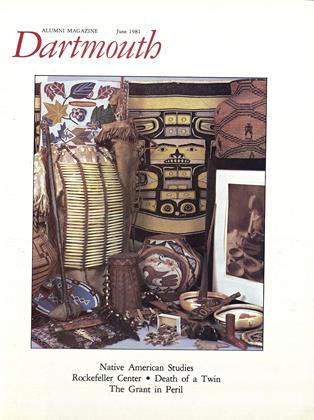IN the first year, Dartmouth's Native American Studies Program consisted of four courses, in which 91 students enrolled. At present, the expanded core includes 11 course offerings, which last year were taken by a total of 196 students (of whom 27 were Native American). "Introduction to Native American Studies" concentrates on traditional native North American culture, emphasizing the "pre-contact" period before 1492. "Introductory Native American Language" is offered more or less biennially and may teach any one of the 80 or so languages currently in use by native peoples in this country. "The Invasion of America: 1492-1890" analyzes ethnohistorically the impact on Native Americans of the European invasion of North America and the relations between the two peoples. "Native Americans in Contemporary Society" (Anthropology 40 under its other name) traces the activities of native peoples from the milestone Allotment Act of 1887 into the contemporary period.
"Native American Oral Traditional Literature" examines the great native literary forms: creation, trickster, and culture hero myths, ritual and lyric poetry, oratory, oral history, and autobiography. "Native American Literature" deals with contemporary Native American fiction. "History of the Indian Policy of the United States" analyzes historically the goals of United States Indian policy and the various plans designed to achieve it, such as removal, reservation, allotment, the Indian New Deal, and termination.
The program also offers both freshman and advanced seminars, the specific topics of which vary. Seminars have been taught, for instance, on ethnopoetics, Native American religion, women in Native American societies, and the history of Native American science. "Native American Studies 85" is a custom-tailored course for independent study. Courses drawn from other departments are applicable to certification in or a modified major with Native American studies (which does not offer a major). These courses include four from anthropology, two from comparative literature, one from English, one from environmental studies, one from geography, seven from history, one from music, two from policy studies, one from religion, one from sociology, and five from Spanish.
The syllabi for many of the N.A.S. courses are models of organization and clarity and include not only such seriously intriguing lecture titles as "Traditional Eskimo Subsistence" and "Warrior Women of the Plains," but also some wittily profound ones "Enslavement and Genocide in the Fur West" and "Vanishing American or Returning Native?" for instances. The program also offers a highly respected internship program which gives students the opportunity to work in a native community doing such things as collecting autobiographies for tribal history projects, explaining computer technology, or researching a reservation's legal questions.
 View Full Issue
View Full Issue
More From This Issue
-
 Feature
FeatureDeath and Reunion: the loss of a twin
June 1981 By George L. Engel -
 Cover Story
Cover StoryThe Long-Deferred Promise
June 1981 By Shelby Grantham -
 Feature
FeatureRockefeller Center: the ideal of reflection and action
June 1981 By Donald McNemar -
 Feature
FeatureA Dull Little Bug Imperils the College Grant
June 1981 By Ted Winterer -
 Article
ArticleDartmouth Authors
June 1981 -
 Article
ArticleThe National Committee
June 1981








